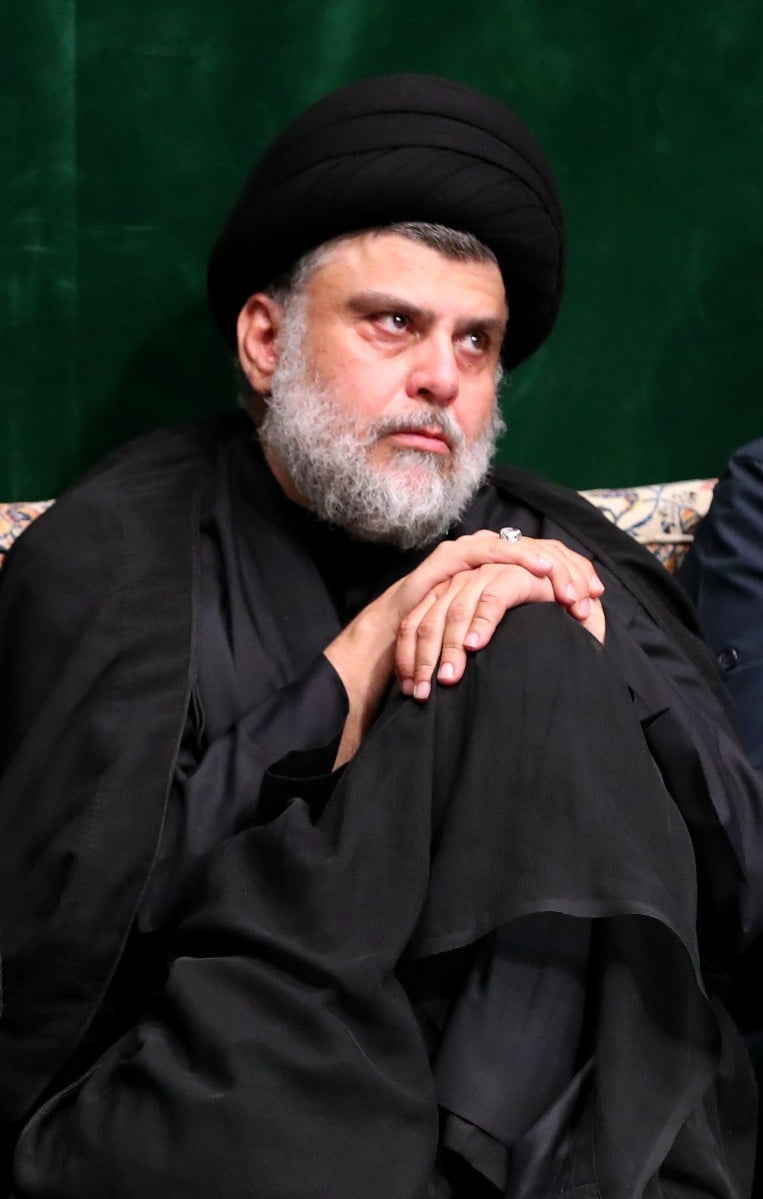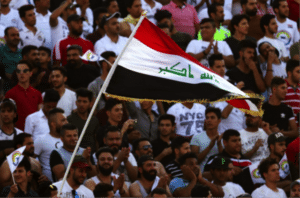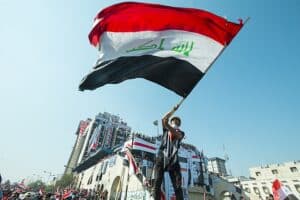Muqtada al-Sadr in 2019 (source: Wikimedia Commons)
This Friday, thousands of Iraqis took to the streets in Baghdad, the country’s capital, to demand regime change. The protesters were affiliated with the Iraqi protest movement of 2019, that has since died down. The 2019 movement called for a complete political overhaul and demanded an independent, non-corrupt government. The non-partisan protesters on Friday urged political change in response to violent clashes between rivalling Shia factions this summer.
Political deadlock
Friday’s protest followed months of political paralysis in Iraq. The country finds itself in a political deadlock since the victory of the Shia political leader Muqtada al-Sadr in the national elections in October 2021. Al-Sadr has attempted to form a majority coalition ever since, but has failed to do so, due to disagreements with rival Shia factions. The political leader aimed to form a government with the Sunni Taqadoom party and the Kurdish KDP, which would side-line the powerful Shia factions affiliated to the Hashd al-Shaabi, a conglomerate of militias loyal to Iran. For these factions, their exclusion from government would mean a loss of influence, but also legal vulnerability.
Al-Sadr’s intended exclusion of rival Shia factions is consistent with his promise to reform the practice of ‘consensus governments’ that has dominated Iraqi politics since 2005. In these ‘consensus governments’ all political blocs are included in administration. The lengthy bargaining process and backroom politics that result from this practice are widely considered as fostering political malfunctioning and clientelism. Al-Sadr wants the country to adopt a political system of governments elected by a simple majority, and a parliamentary opposition. However, for al-Sadr’s rival Shia factions, exclusion from administration is unacceptable.
Violent clashes
The disagreement between the two rivalling Shia blocs has paralyzed Iraqi politics since October 2021 and erupted in violent clashes this summer. In June, al-Sadr demonstratively ordered his 73 parliamentarians to hand in their resignation, out of frustration with the ongoing gridlock. When his rivals claimed these seats for their own candidates that had come in second in the elections, al-Sadr called for holding new elections. When both his rivals and his former allies refused, he ordered his supporters to storm parliament. After al-Sadr on Monday declared that he was completely withdrawing from politics, his followers stormed the Green Zone – home to government offices, the United Nations, and embassies. This resulted in fighting between al-Sadr’s supporters, armed with rifles, and government security forces, that included rival Iran-backed militias. At least 30 al-Sadr-supporters were killed. After al-Sadr called on his supporters to end the violence on Tuesday, the fighting immediately ceased.
Anti-government protests
The clashes of this summer have sparked concerns that the country might be descending into a cycle of factional violence that has haunted the country for two decades. The non-partisan Iraqis marching the streets of Baghdad this Friday in response to the clashes demanded regime change and rejected Iranian involvement in Iraqi politics. They chanted the slogan of the Arab Spring ‘the people want the fall of the regime’ and ‘Iran will not rule anymore’. They also called for justice for their colleagues who were killed by security forces during the protests in 2019.
In addition to the political deadlock, Iraqi society is confronted with several other crises. The country is plagued by high (youth) unemployment rates, a weak economy and crumbling public services. Moreover, the political paralysis has incapacitated parliament’s ability to meet the Iraqi people’s needs, blocking important bills from passing. One third of the Iraqi population is currently living in poverty. The political unrest of the past weeks does not appear to contribute to solving these issues. It cannot be ruled out that violence between the two rival Shia camps will flare up again. For now, Iraq’s political future remains extremely unpredictable.
Sources: Al Jazeera 1, Al Jazeera 2, Al-Monitor, The New York Times, De Volkskrant
Photo: Wikimedia Commons



